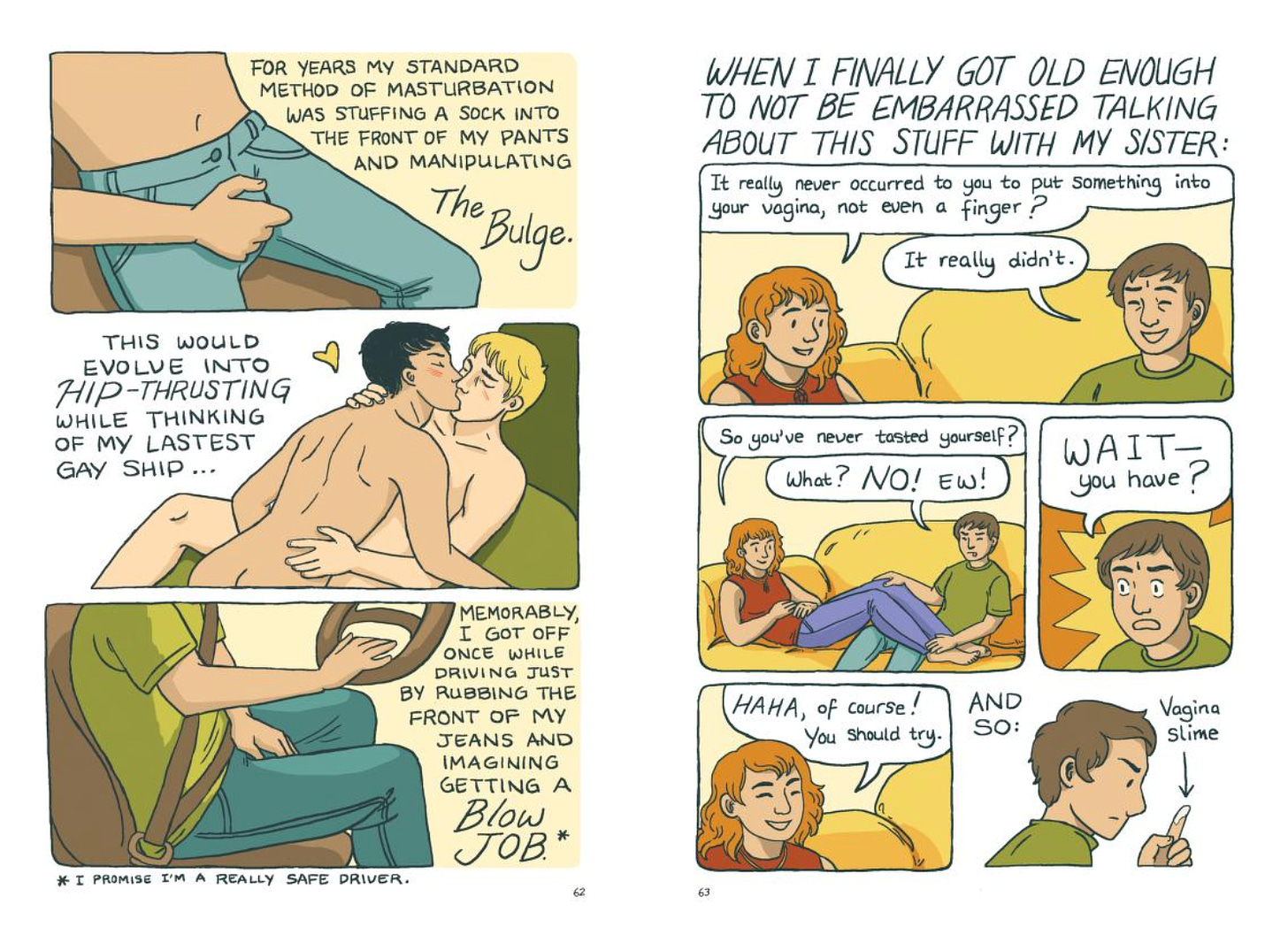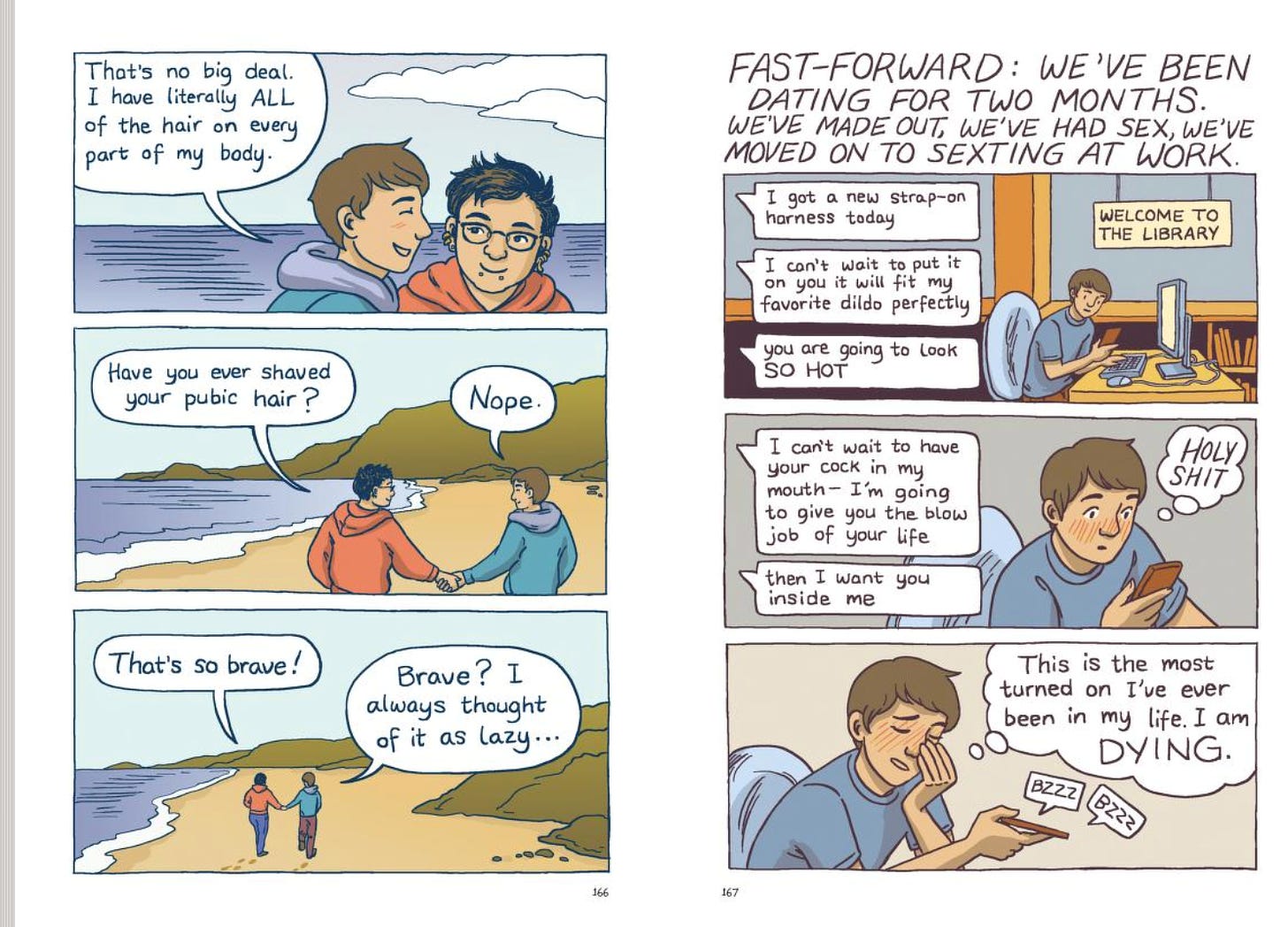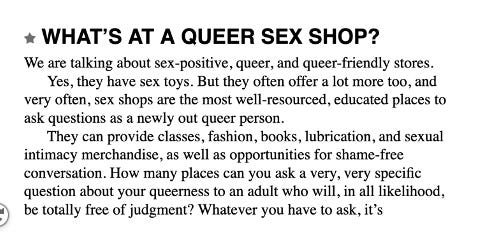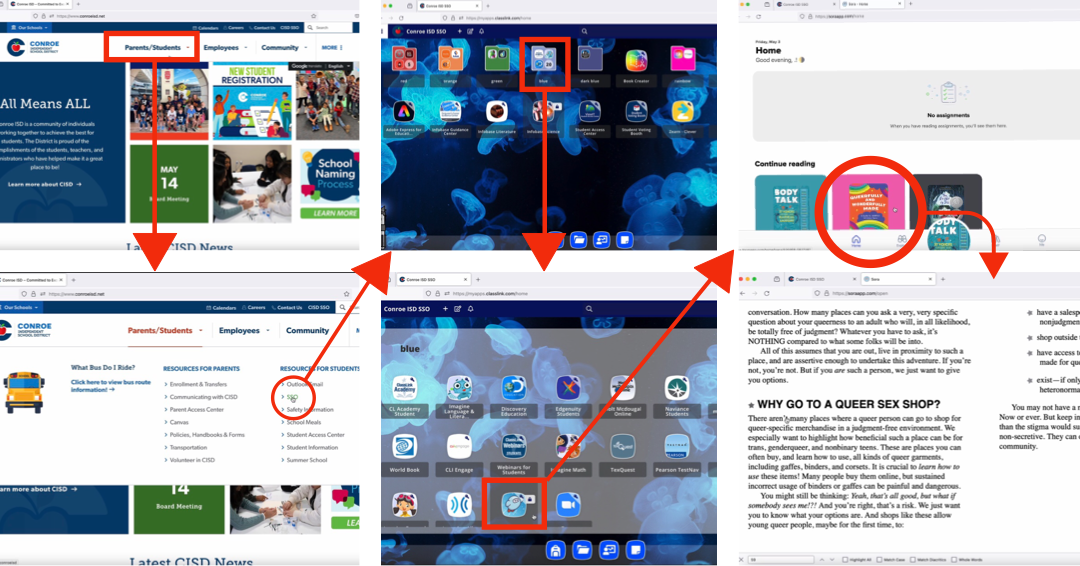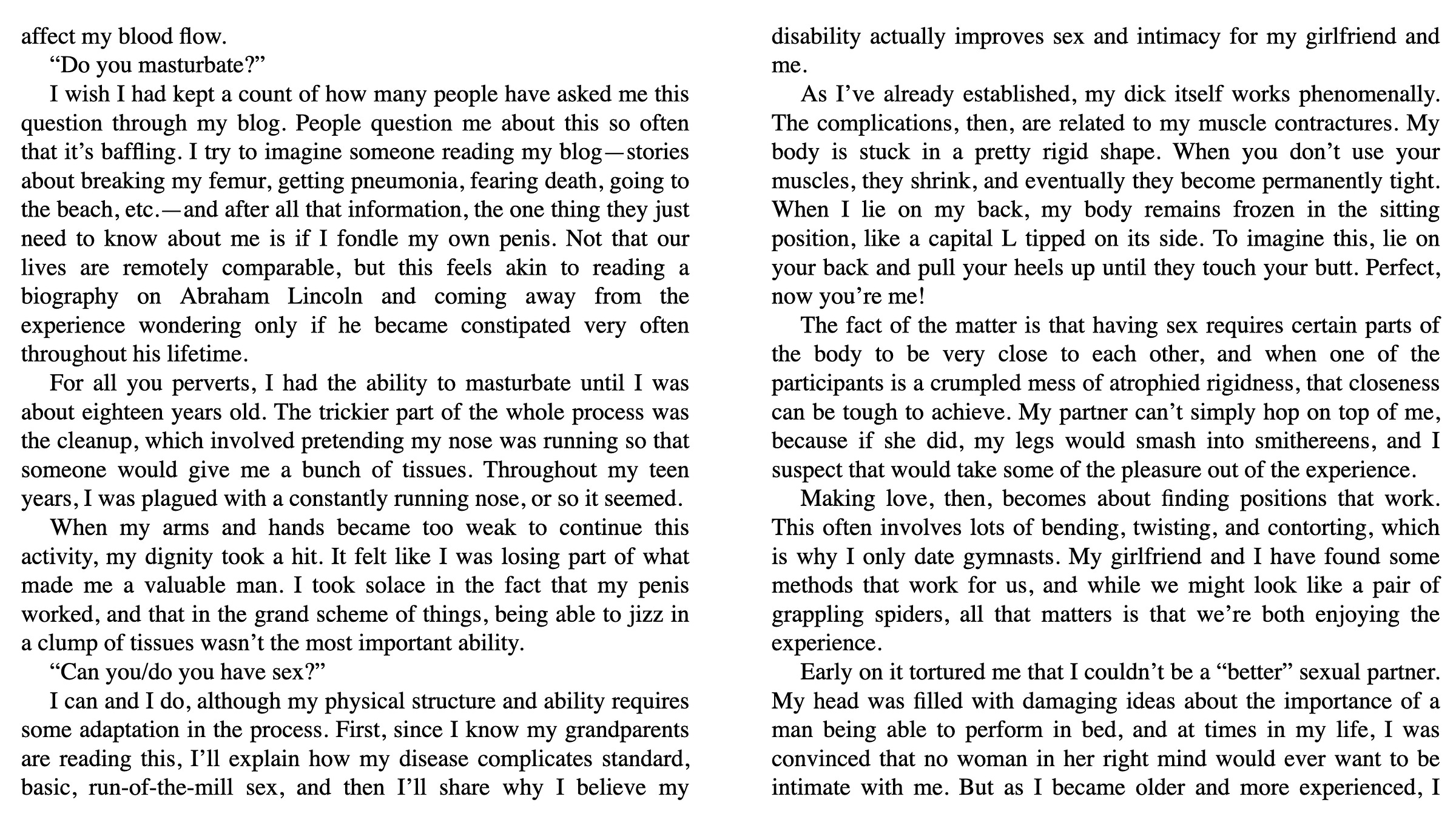

Discover more from Two Moms and Some Books
If you have a child in Conroe ISD, this is a MUST READ: It All Hinges on Pico (Not the salsa)
Explicit Material Alert! This app is probably in other area districts as well.
Editor’s Note: This article contains explicit images found in children’s books. We decided to display these images unedited, since this is how the images are being displayed to children. Most of the images shown are available to jr. high children (possibly younger) in Conroe Independent School District.
article written by: Melissa Semmler
(Melissa Semmler is an English professor, a mom of two great kids, and a candidate for the Conroe ISD School Board. She believes reading creates windows into new worlds, and these worlds can leave us forever changed. Check out her campaign at: https://melissasemmlerforconroeisd.com/)
Author’s Note: I wrote this article in response to being called a book banner by librarians in Conroe ISD and in the Montgomery County Library System. I have a master’s degree in English literature, and I work as an English professor. I love reading and books, and I have dedicated my life to sharing my love of the written word. If I am going to be called a book banner for believing pornography does not belong in school libraries, so be it, but I must stand for my principles. In this article, I first discuss federal and state law regarding pervasive vulgarity, and then I discuss some of the books that are currently in the library. While the excerpts are graphic, it was necessary to include them to demonstrate that these works do, in fact, contain pornography, which is against federal and state law.
It All Hinges on Pico. (Not the salsa)
Back in 1982, the Island Trees School Board wanted to remove some books from the district’s library because they deemed them inappropriate for an educational setting. However, a group of citizens, including high school student Stephen Pico, wished for the books to remain in the library. They sued the district, stating that their First Amendment rights had been violated, and the case went all the way to the U.S. Supreme Court. Over the years, the case Island Trees School District v. Pico, has become somewhat obscure. However, it typifies arguments currently occurring in school districts across the country, so much so that it is referenced in Texas Education Code 33.021, stating library materials that are pervasively vulgar or educationally unsuitable should be prohibited in a school district’s collection development policy. The law clearly states that it is the responsibility of Texas school districts to identify and remove sexually explicit and pervasively vulgar materials from the school library collections, but these materials continue to turn up.
In Pico, the school board sought to remove books from the school libraries because they stated the books were anti-American. The school board also told the press that they wished to protect children from moral danger. (Lord help them if they saw what’s in the school libraries now.) The Supreme Court ruled there must be a nondiscriminatory reason for removing books, and it says the First Amendment prohibits school boards from removing books if their intention is to eliminate the representation of diverse ideas. So, while the Supreme Court recognized that school boards have a wide purview when it comes to determining what books are suitable for school libraries, that purview is limited by adherence to the First Amendment. The dividing line here is razor thin, and it hinges on whether a book can be considered pervasively vulgar. Justice Brennan stated:
With respect to the present case, the message of these precedents is clear. Petitioners rightly possess significant discretion to determine the content of their school libraries. But that discretion may not be exercised in a narrowly partisan or political manner. If a Democratic school board, motivated by party affiliation, ordered the removal of all books written by or in favor of Republicans, few would doubt that the order violated the constitutional rights of the students denied access to those books. The same conclusion would surely apply if an all-white school board, motivated by racial animus, decided to remove all books authored by blacks or advocating racial equality and integration. Our Constitution does not permit the official suppression of ideas. Thus, whether petitioners' removal of books from their school libraries denied respondents their First Amendment rights depends upon the motivation behind petitioners' actions. If petitioners intended by their removal decision to deny respondents access to ideas with which petitioners disagreed, and if this intent was the decisive factor in petitioners' decision, then petitioners have exercised their discretion in violation of the Constitution. To permit such intentions to control official actions would be to encourage the precise sort of officially prescribed orthodoxy unequivocally condemned in Barnette. On the other hand, respondents implicitly concede that an unconstitutional motivation would not be demonstrated if it were shown that petitioners had decided to remove the books at issue because those books were pervasively vulgar.
The focus on intent
This focus on intent is the reason we see so many progressives referring to eliminating diversity of thought when removing vulgar books from schools. In current school board book disputes, vulgarity is encapsulated within the very definition of diversity of thought. Because sexuality is the primary focus of many books being argued, progressives seek to defend vulgar books by demonstrating that vulgarity itself is the idea being suppressed. For instance, in the book Lily and Dunkin, the mom states, “She told me she wants to cut her penis off, Gary. That it didn’t belong.” Because Lily is trans, the vulgarity inherent in cutting her penis off is indistinguishable from Lily’s sexual identity.
If pervasive vulgarity is inherent in the idea itself, removing a vulgar book is essentially suppressing ideas. However, progressives neglect to note that there are many books with non-straight characters that do not contain vulgarity, so it is possible for a story to contain a trans character without vulgarity. Is it really necessary to inundate LGBTQ+ students with stories about exploring sexual identity? They most certainly have other meaningful formative life experiences. In fact, look at all the beautiful gifts the LGBTQ community has brought the world. Alan Turing was the father of theoretical computer science and AI. Oscar Wilde wrote stunningly hilarious satire and beautiful prose. Sally Ride was a physicist and the youngest U.S. astronaut to enter orbit. All of these people were gay, and none of them would have said their sexuality fully defined them as human beings. Vulgarity in school libraries is completely unnecessary because it is wholly possible for all voices to be represented without vulgarity in the text. Additionally, the Supreme Court did not say pervasive vulgarity is okay if the text also represents a good idea; it says pervasively vulgar texts should not be in school libraries.
Is it vulger?
Some argue that these books are not, in fact, vulgar. However, there is a rather good litmus test for determining whether something is vulgar. If a work is so vulgar that it couldn’t be read out loud in a school board meeting, it probably crosses the threshold for vulgarity and should be removed. Though, Trustee Datren Williams of Conroe ISD questioned whether concerned parents were trying to impose white, Christian values on the district, Pastor John Amanchukwu, who is a black Christian, was escorted out of a Midland Independent School District for reading the book PUSH out loud during the school board meeting. Amanchukwu told the board, “If you leave it in here, you’re a punk or a pervert. Remove the trash; take it out tonight. These students deserve better.” Here, the book being argued was so pervasively vulgar that Amanchukwu was escorted out of the meeting. This should indicate that it is inappropriate to shelve it in a school library. Amanchukwy is right; these students deserve better. It doesn’t matter what ethnicity or sexual orientation the student is; that student deserves quality educational material that is free from vulgar, pornographic material disguised as a virtuous display of creative expression.
Video of Pastor John Amanchukwu: https://fb.watch/rOJP75vZbj/
The American Library Association weighs in.
Sadly, the ALA disagrees. During the opening keynote of the American Library Association’s recent Library 2.0 Conference, Dr. Emily Knox, Ph.D. describes the book Gender Queer, stating,
“In Gender Queer, Maya is saying, this is how I understood myself…because Maya is expressing herself creatively. These works give people vocabulary to describe themselves. To say who they are as human beings in the world.”
Maya is graphically exploring her sexuality throughout Gender Queer, and the ALA’s greatest minds have determined that documenting the ways Maya participates in sexual activity is a creative way to establish the most fundamental aspect of who she is. (See graphics from Gender Queer below. Sorry about the strap on. I didn’t write it, and I certainly didn’t include it in a school library collection.)
https://x.com/ladykennington/status/1671120070108405760 (Video with Dr. Emily Knox)
Personally, I’m straight. I don’t really like to discuss my preferences with anyone other than my spouse, so dear reader, I’m sorry to inform you that you won’t see me establish the history of my sexuality through prose today (or ever) because WHO WANTS TO DO THAT?! Seriously, would you ever want to graphicly describe every sexual encounter you’ve had IN A BOOK and draw accompanying pictures for mass consumption? If, on the off-chance, you say you would like to do that (way to be on trend, by the way), would you say that this literary endeavor described the most fundamental aspect of your existence? I also accept that some people may say yes to that question, but I think that’s very sad. When we say that the most important aspect of a human being is voyeuristic, hedonistic, sexual gratification, we have reduced that person to nothing more than a sexual object, and THAT’S why this book is garbage. Cut the crap ALA. Just because this book contains a queer person exploring their sexuality does not make this literature. It’s insulting to the queer community that you have reduced them to this, and it’s insulting to well-intentioned Americans everywhere that you are calling us homophobic book banners for not wanting this propagandistic rag in our kids’ libraries.
What is going on at Conroe ISD?
Many people think that there are just a couple of these vulgar books, and librarians simply failed to catch them. Since Gender Queer and other books were removed from most school libraries (including Conroe ISD), they think the books have been removed, and the problem is solved. On the contrary, there are hundreds of vulgar books available in the school libraries, and they contain the most graphic descriptions of sexual encounters that you could imagine. Some of them, like Lily and Dunkin, even contain links that will take children to chats with gender affirming therapists, who will then refer them to chat rooms like Trevor Space, where they can chat with other people exploring their sexualities. While many of these graphic books do target the LGBTQ+ community, there are plenty of graphic romances describing the sexual encounters of straight teens, as well. Many of the books establish that the characters are minors prior to describing the graphic sexual encounters, leaving no doubt that we are reading child porn. Parents are often quick to say they don’t want library books banned, and the scenes portrayed in these books couldn’t possibly be that bad. The fact is that the books are filled with pornographic material, and you would never know from looking at the cover or the synopsis. For some reason, the ALA, the book distributors, and many school personnel have lost their moral compass and feel so justified in peddling pornographic material to minors that they have the nerve to call parents book banners when this content is questioned. Just look at this book called Queerfully and Wonderfully Made which is currently available to seventh graders in Conroe ISD through the Sora app:
Conroe ISD online library
Parents would not be safe in assuming that Conroe ISD is vetting the library books in their online library. Several board members fought Trustee Tiffany Nelson when she wanted the Conroe ISD book policy to reflect state law, and when we look at this text, it is clear that the provision was necessary. Perhaps the IT department is too busy fighting to keep books like Lily and Dunkin in Conroe ISD libraries to focus on making sure it doesn’t provide apps with pornographic literature. After all, Dr. Jared Lambert/ CB, the Director of Information Systems, argued staunchly for Lily and Dunkin during the March 2024 Conroe ISD school board meeting.
You might be thinking the book Queerfully and Wonderfully Made just slipped in, and there couldn’t be any others like it. If you’re thinking that, you’d be wrong. Check out this book, Body Talk, with these suggestive graphics sprinkled throughout the pages. What seventh grader doesn’t need graphics of naked bodies decorating their literature?
Here’s an excerpt from an essay in the book called, Your Complete Guide to Shane’s Sex Life by Shane Burcaw:
I can only assume that, because Shane Burcaw is severely disabled, the vulgarity in this passage is trumped by the disability, making this work acceptable for a middle school library. When Conroe ISD sent home the consent form for sex ed, they neglected to mention that they’d be providing sex ed materials through the Conroe ISD online library app, Sora, without any thought to parent consent. Personally, I found out about this app because my seventh grader is only allowed on the computer downstairs. When she pulled up an inappropriate text on the app, she informed me by reading it loudly in the kitchen while I was making dinner. My five-year-old heard a story being read and ran into the kitchen, hoping for a story from his sister. Stunned, it took me a second to pause dinner, address the situation, and shut it down. Needless to say, this is not the literary experience I had hoped my children would receive from their school district.
I’ve been sorting through the app all month, and there are many sexually explicit stories. Lest someone assume that I mean erotica, where the sexual encounter is alluded to, allow me to present this excerpt from Skin and Bones, written by Sherry Shahan:
All of these works are available on Conroe ISD’s Sora App right now, and a small group of radical teachers and librarians, who have banded together with a group called “The Texas Freedom to Read Project,” have already been calling me out as a book banner for questioning library content. (See one of their graphics, posted by a CISD teacher below.) While The Texas Freedom to Read Project claims to be run by three Texas parents who are fighting against censorship, it is supported by the American Library Association, and the messaging is identical to the ALA’s messaging. The ALA wants their messaging to seem grassroots; when in fact, they have a massive PR machine that uses the censorship and book banning narrative to silence parents. Hence, they not only refuse to remove the books, but they actively argue for them to remain in the libraries by shifting the narrative to censorship and book banning.
As a teacher, I can say that I think this places a terrible burden on other teachers and parents. Some school board members have suggested that parents should take responsibility for what their children are reading in the library by being engaged in each book they are reading. In order to go through the books listed in this article, I put all of my personal reading aside for several weeks and focused on the books I could find in the Sora app. If my child is to be limited to books that I have read first because her school district refuses to remove pornographic content from their library, this is going to limit her freedom to read considerably. Additionally, are teachers going to be responsible for reading every book in this app? How will they even know what books students are accessing while in class? Is there a way for them to monitor every computer? This places a terrible burden on parents and teachers, which will limit students’ ability to read, not enhance it.
School libraries should be held to a higher standard because they are school libraries, and as such they hold the responsibility of making a vast world of information available to minors. When information comes from the school, the school is essentially endorsing it. Removing books like Gender Queer from school libraries has nothing to do with the sexual orientation of the characters and everything to do with the fact that the scenes are pornographic. No one is trying to suppress the idea of being gay when they remove this content. The fact that the main character is gay or exploring her sense of self does not negate the drawing of a strap-on dildo, or the graphic depictions of the main character’s sexual fantasies and encounters. School boards have the responsibility and the right to remove books like this because they are not suppressing ideas but removing vulgarity, and this was determined by the US Supreme Court in Pico more than forty years ago.





